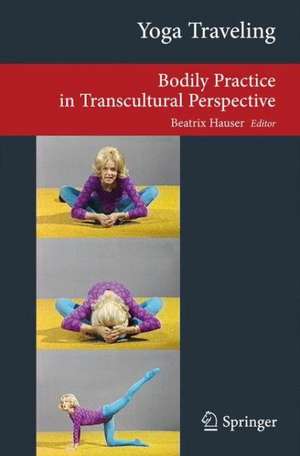Yoga Traveling: Bodily Practice in Transcultural Perspective: Transcultural Research – Heidelberg Studies on Asia and Europe in a Global Context
Editat de Beatrix Hauseren Limba Engleză Paperback – 2 iul 2013
Din seria Transcultural Research – Heidelberg Studies on Asia and Europe in a Global Context
- 18%
 Preț: 948.92 lei
Preț: 948.92 lei - 18%
 Preț: 1216.48 lei
Preț: 1216.48 lei - 15%
 Preț: 637.59 lei
Preț: 637.59 lei - 15%
 Preț: 636.80 lei
Preț: 636.80 lei - 18%
 Preț: 939.46 lei
Preț: 939.46 lei - 15%
 Preț: 648.24 lei
Preț: 648.24 lei - 15%
 Preț: 639.25 lei
Preț: 639.25 lei - 15%
 Preț: 643.34 lei
Preț: 643.34 lei - 15%
 Preț: 640.55 lei
Preț: 640.55 lei - 18%
 Preț: 889.75 lei
Preț: 889.75 lei - 15%
 Preț: 649.54 lei
Preț: 649.54 lei - 15%
 Preț: 632.52 lei
Preț: 632.52 lei -
 Preț: 386.99 lei
Preț: 386.99 lei - 15%
 Preț: 636.30 lei
Preț: 636.30 lei -
 Preț: 387.75 lei
Preț: 387.75 lei -
 Preț: 363.52 lei
Preț: 363.52 lei - 18%
 Preț: 784.61 lei
Preț: 784.61 lei - 15%
 Preț: 644.18 lei
Preț: 644.18 lei - 18%
 Preț: 897.14 lei
Preț: 897.14 lei - 18%
 Preț: 779.57 lei
Preț: 779.57 lei - 15%
 Preț: 584.10 lei
Preț: 584.10 lei - 15%
 Preț: 588.37 lei
Preț: 588.37 lei
Preț: 419.06 lei
Nou
Puncte Express: 629
Preț estimativ în valută:
80.21€ • 87.16$ • 67.42£
80.21€ • 87.16$ • 67.42£
Carte tipărită la comandă
Livrare economică 21 aprilie-05 mai
Preluare comenzi: 021 569.72.76
Specificații
ISBN-13: 9783319003146
ISBN-10: 3319003143
Pagini: 260
Ilustrații: XI, 248 p. 11 illus., 8 illus. in color.
Dimensiuni: 155 x 235 x 14 mm
Greutate: 0.36 kg
Ediția:2013
Editura: Springer International Publishing
Colecția Springer
Seria Transcultural Research – Heidelberg Studies on Asia and Europe in a Global Context
Locul publicării:Cham, Switzerland
ISBN-10: 3319003143
Pagini: 260
Ilustrații: XI, 248 p. 11 illus., 8 illus. in color.
Dimensiuni: 155 x 235 x 14 mm
Greutate: 0.36 kg
Ediția:2013
Editura: Springer International Publishing
Colecția Springer
Seria Transcultural Research – Heidelberg Studies on Asia and Europe in a Global Context
Locul publicării:Cham, Switzerland
Public țintă
ResearchCuprins
Introduction: Transcultural Yoga(s): Analyzing a Traveling Subject.- Part I: Reframing Yoga in the History of the Twentieth Century.- Transnational Exchange and the Genesis of Modern Postural Yoga.- Magic and Yoga: The Role of Subcultures in Transcultural Exchange.- The Impact of Kundalini Yoga on Concepts and Diagnostic Practices in Psychology and Psychotherapy.- Part II: Inconsistent Assessments: Meaning Production at the Local-Global Interface.- Touching the Limits, Assessing Pain: On Language Performativity, Health and Well-Being in Yoga Classes.- The Useful Body: The Yogic Answer to Appearance-Management in the Post-Fordist Workplace.- The Introduction of Yoga in German Schools: A Case Study.- Part III: The Other Consumers: Values, Mobility, and Markets.- Consuming Yoga, Conserving the Environment: Transcultural Discourses on Sustainable Living.- The Social Life of Yoga: Exploring Transcultural Flows in India.- Yoga as a Production Site of Social and Human Capital: Transcultural Flows from a Cultural Economic Perspective.
Textul de pe ultima copertă
This book focuses on yoga’s transcultural dissemination in the twentieth and twenty-first centuries. In the course of this process, the term “yoga” has been associated with various distinctive blends of mental and physical exercises performed in order to achieve some sort of improvement, whether understood in terms of esotericism, fitness, self-actualization, body aesthetics, or health care. The essays in this volume explore some of the turning points in yoga’s historico-spatial evolution and their relevance to its current appeal. The authors focus on central motivations, sites, and agents in the spread of posture-based yoga as well as on its successive (re-)interpretation and diversification, addressing questions such as: Why has yoga taken its various forms? How do time and place influence its meanings, social roles, and associated experiences? How does the transfer into new settings affect the ways in which yogic practice has been conceptualized as a system, and on what basis is it still identified as (Indian) yoga? The initial section of the volume concentrates on the re-evaluation of yoga in Indian and Western settings in the first half of the twentieth century. The following chapters link global discourses to particular local settings and explore meaning production at the micro-social level, taking Germany as the focal site. The final part of the book focuses on yoga advertising and consumption across national, social, and discursive boundaries, taking a closer look at transnational and deterritorialized yoga markets, as well as at various classes of mobile yoga practitioners.
Caracteristici
Presents contributions by well-known scholars in the field of modern yoga studies as well as several new authors from a broad range of disciplines (social anthropology, sociology, psychology, history of religions, education) Investigates social phenomena related to yoga as cases in point to consider the transcultural flow of ideas, not following just one path, direction, or logic Explores yoga as a situated practice, shaped in distinctive ways against the backdrop of both global forces and local imaginings of India and its traditions Includes supplementary material: sn.pub/extras






